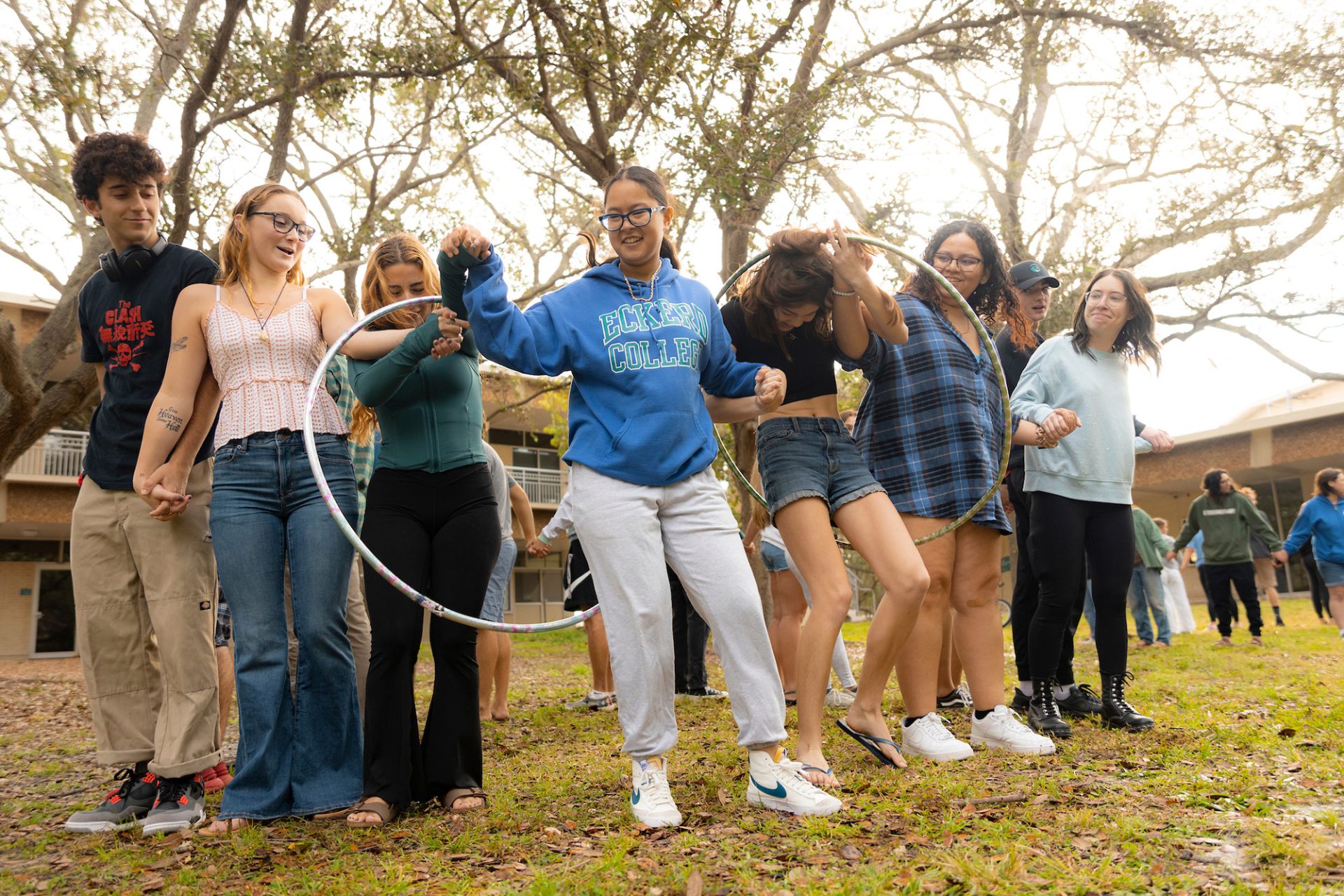
While many students venture abroad for Winter Term, courses also are offered on campus, such as this Leadership and Self-Discovery Practicum class for first-year students. Photo by Penh Alicandro ’22
Who Broke College?
That’s the provocative title of a new, first-of-its-kind Eckerd College Winter Term course offered by Jack Layden ’17, director of residence life and leadership programs at the College. The course, Layden explains, is based in part on data that shows state and federal funding for public colleges and universities has been decreasing since 2008. And that many smaller private liberal arts colleges, especially in the Northeast, are struggling financially because there are so many of them and the competition for students is fierce.
He adds that the money crunch in higher education is happening not just in the United States, but in China and other countries. “Wealth plays a huge role in whether or not you go to college,” he says, “leaving out really capable people who want to help their nation grow.” A 2022 survey of 2,500 American adults by BestColleges.com found that 62% believe financial challenges make college inaccessible. Rising tuition was among the main reasons.
During the course, Layden and his students will look for answers. “Colleges are mission-driven institutions,” he says, “but more and more colleges are finding it difficult to survive and meet expectations. There’s a lot of emphasis now on private fundraising and other revenue-generating operations. And there are a lot of problems, all of them human-made.
“Colleges are doing amazing work,” he adds, “but they have to continue to do what they do well—educate people, help them find fulfilling careers, and inspire them to contribute something to the world. There’s a lot of misinformation about who’s to blame, but we also have to have a conversation about how we fix it.”
The goal of the course, Layden says, “is to afford time and resources so that students can learn more about their current situation and become informed in order to speak from a place of knowledge when discussing issues related to higher education.
“In this course we will explore the past, contemporary and potential future of the fiercely competitive global higher education market to learn how nations build universities. We will examine the impact that the internationalization of education has had on different regions of the world and how more-developed countries help, and suppress, the advancement of higher education in less-developed countries.”
After serving two terms as president of the Eckerd College Organization of Students, Layden graduated with honors, earning a bachelor’s degree in management, with minors in Chinese and visual arts. In 2019, he earned a Master of Education degree from Boston University.

Director of Residence Life and Leadership Programs Jack Layden ’17
A January tradition at Eckerd since 1961, the three-week Winter Term offers students a chance to study abroad or on campus. In 2023, nearly 1,300 Eckerd students took a Winter Term course, and the College sent 395 students to 20 international locations—including Australia, the Bahamas, Belize, Cambodia, Chile, Cuba, Ecuador, England, France, French Polynesia, Greece, Honduras, Italy, Japan, Morocco and Tobago.
Winter Term 2024 includes more than 60 course offerings—on campus and abroad—and runs from Jan. 3 to Jan. 26. There are no prerequisites, everyone can focus on a single course topic, and students can fulfill an academic-area requirement. The 2024 on-campus Winter Term courses include, among others, Making Waves: Writing Activism in Florida; Astronomy: Eclipse and Beyond; and Toasting, Roasting and Boasting.
“This will be my first purely academic class [to teach],” Layden points out, “but that’s what I’m excited about. The landscape and market of higher education is so complex and fascinating, and students who are interested can learn about it at Eckerd.
“We’ll learn about the major world events that help to advance education and how nations use policy, money and social perception to build talent and develop so-called world-class universities,” he adds. “We’ll also examine why, despite all this work, we still find ourselves asking, ‘Who broke college?’”
